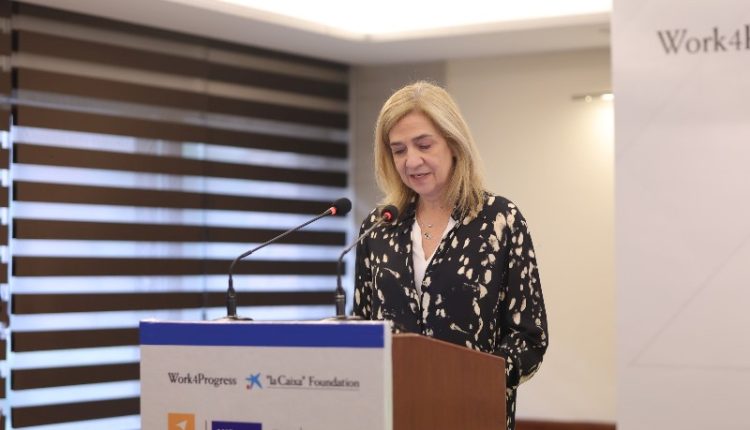Work4Progress India Annual Conference 2025 Convenes Leaders to Advance Inclusive Entrepreneurship and Systems Change
New Delhi: Over 100 leaders, practitioners, and changemakers gathered at the India Habitat Centre in New Delhi for the Work4Progress India Annual Conference 2025, marking eight years of collaborative action to build resilient, inclusive, and green livelihoods across India.
Her Royal Highness the Infanta Cristina, Director of the International Area at the ”la Caixa” Foundation, delivered a special address reaffirming the Foundation’s commitment to promoting equal opportunities and reducing inequalities across Africa, Asia, and Latin America. Under her leadership, the Foundation has implemented more than 780 projects across 70 countries. Reflecting on the Foundation’s approach, H.R.H. the Infanta Cristina remarked, “What makes W4P unique is its ability to listen deeply to local aspirations and co-create solutions that truly work for communities. The program brings together diverse actors across sectors to collaborate, adapting to changing environments and conditions, learning continuously -shaping strategies through developmental evaluation and feedback”.
The conference, led by the ”la Caixa” Foundation’s Work4Progress (W4P) programme, brought together partners from civil society, financial institutions, research organisations, and public stakeholders to share innovations and chart pathways for scaling inclusive entrepreneurship through systems thinking. Arthan served as the ecosystem partner for the event and also plays a pivotal role in strengthening the talent, organisations, and systems that drive India’s social impact ecosystem. Opening the day, Anchal Kakkar, Co-Founder of Arthan, welcomed participants and set the tone for the day. Kakul Misra, Director-Strategic Capacity Building, Indian School of Development Management (ISDM), then presented insights on leadership and management in the social impact sector.
Driving Impact Through Collaborative Networks
The W4P platform in India operates through four networks, including Development Alternatives (DA), ActionAid Association, ACCESS Development Services, and Rang De, with ISDM as the platform governance partner, working collectively to create sustainable and equitable rural livelihoods. To date, over 27,500 enterprises have been supported, mobilising €2.5 million in resources and partnering with over 50 organisations to institutionalise social innovation approaches.
Marta Solsona Masana, Head of the Work4Progress Programme at the ”la Caixa” Foundation, highlighted the programme’s global vision: “Work4Progress fosters collaboration, deep listening, and co-creation to drive systemic change. Through our Virtual Lab — a digital platform connecting networks in India, Mozambique, Peru, and Colombia — we’re enabling knowledge sharing and data-driven learning across borders. Notably, 74% of active prototypes now integrate climate adaptation and resilience.”
Gorka Espiau, Scientific Director of the Work4Progress Programme, emphasized the critical role of networks: “Strong partnerships, shared learning, and aligned strategies are essential to driving systemic change. The Work4Progress ecosystem demonstrates how collective action can accelerate social innovation at scale.”
Social Innovation as a Way of Thinking
Network leaders emphasized that true systems change requires rethinking how entrepreneurship development is approached. “Social innovation is not a tool, but a way of thinking and leading differently — it’s about listening deeply, learning continuously, and co-creating with courage,” shared Kanika Verma, Executive Vice President, Development Alternatives.
Smita Ram, CEO and Co-Founder of Rang De, added about how deep listening and collaboration have been central to the network’s approach, especially in enabling women and youth entrepreneurs to design solutions that truly reflect community aspirations. “Listening has become intentional in our work; it’s what helps us move from prototypes to real, community-owned solutions.”
Building on this, Vipin Sharma, CEO of ACCESS Development Services, emphasised the importance of moving from fragmented efforts to collective impact, noting that “our collective challenge is to move from fragmented efforts to systemic solutions. The Work4Progress network is showing that when collaboration is deep and continuous, it can unlock sustainable, resilient livelihoods at scale.”
Creating Enabling Environments
A panel discussion on “Accelerating Green and Inclusive Livelihoods,” moderated by Raisha Galib of Climate Asia, featured Suhela Khan (UN Women India), Benjamin Mathew (CITTA India Education Foundation), and Ved Arya (Buddha Institute). The conversation explored how enterprises, funders, and enablers can collaborate to create supportive ecosystems for women and youth entrepreneurs navigating climate challenges and market barriers.
The conference concluded with a collective commitment from partners to continue building local ecosystems that empower women and youth, nurture social innovation, and strengthen pathways to dignified livelihoods across India.


